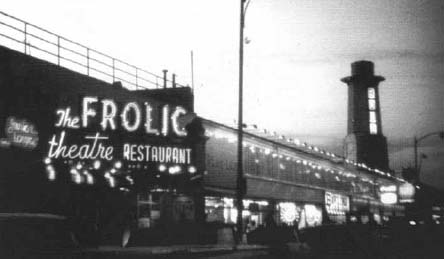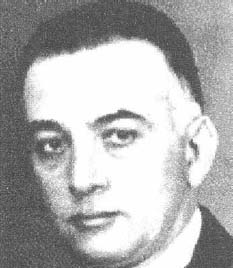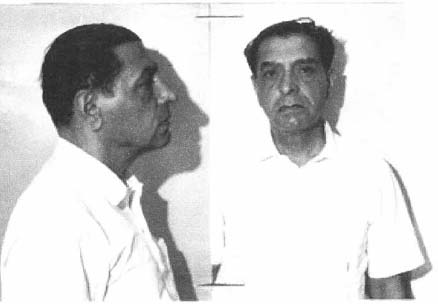Last Rites (2 page)
Authors: William J. Craig

The Caravan Club, looking the same as it did the night Gigi was shot.
Almost immediately, Revere Police, on a traffic detail at nearby Wonderland Dog Track, responded to both scenes. Both men were well known to the police. The driver who was wounded in the buttocks was Vincent Marino, aka Gigi Portalla, a thirty-five-year-old Revere native. The other man was twenty-nine-year-old Charles McConnell, aka Fat Charlie. Club Caravan had about 150 people inside who were uninjured even though a bullet passed through two panes of glass and ricocheted inside the club. The sidewalk outside of the club was littered with shell casings and glass. Gigi was placed on a service table and EMTs began working on him. The police, fearing that McConnell would die from his wounds before an ambulance could arrive, asked him who the attempted assassins were. McConnell answered in true Cagney style, “I'm no rat,” while lying in a pool of his own blood.
As both men were being transported to Massachusetts General Hospital, a Toyota Camry came racing up to Club Caravan. As Revere Police detectives approached the car, they realized that it was Gigi's brother, Eddie Portalla. Eddie had received a call from his mother, who was frantic due to her son just being shot. So he left his home to find out what was happening to alleviate her fears. As he spoke with detectives and looked over the Chrysler riddled with bullets and shattered glass, a call came in over the police radio about another shooting. This one had taken place in the parking lot of the Comfort Inn located on the RevereâSaugus line. Only this time, the gunmen didn't miss.
Revere Police detectives and Eddie drove to the scene only to find the lifeless, bullet-ridden body of Robert Nogueira lying covered in the parking lot with his middle finger sticking straight up, under a sign promising a free continental breakfast. According to witnesses, as Nogueira lay bleeding on the pavement just feet away from the guest room windows, the killer pumped two more slugs into his head. Hotel guest Loretta Westcott, who heard the mob hit, stated, “I'll never stay in Revere again.” Nogueira had been struck by at least ten bullets at approximately 1:30 a.m. He had been living at the Comfort Inn under an assumed name and was a friend of Gigi Portalla and Robert McConnell. Nogueira was from Charlestown, Massachusetts, and had served twelve years for bank robbery at the Braintree branch of the Hancock Bank and Trust Company. His criminal career was begun at age eighteen, when he was arrested for a Melrose Bank heist.
After being questioned by detectives, Eddie proceeded to Massachusetts General Hospital to console his mother and check on his brother's condition. When he arrived at the hospital, he found Charlie McConnell under police guard and in stable condition. McConnell had been hit in the back and arm. Gigi was operated on, but the doctors operated again, claiming that an infection had set in. All the while, he was isolated from his family. Once the Portalla family was assured that he was going to live, they went home for the night.
Meanwhile, the police were just beginning their investigation. At 4:00 a.m., the police recovered a black Lincoln Continental that had been torched nearby on the WinthropâEast Boston line. The car had been reported stolen a few hours earlier from a Boston livery company and matched the description of the gunmen's vehicle that had been seen speeding away from Club Caravan after the shooting. The Revere Police had conducted interviews with the 150 patrons inside Club Caravan as well as the customers of the Wonderland Ballroom. One of the suspects had left his mother's car at the shooting scene, and in the trunk a bulletproof vest and ammo were discovered. In the days that followed, the police continued to gather information from informants, State Police and the Federal Bureau of Investigations.
They soon realized that a shooting that had occurred earlier in October 1996 was tied to the events that had recently taken place at Club Caravan on that cold November night. A local paralegal named Frank Imprescia, who was fifty-seven years of age, had been shot and wounded in October. Frank had been sitting at his desk in the law office of Attorney Leonard Pass, located on busy Revere Beach Parkway. An unknown gunman had fired three rounds through the front window of the office, striking Frank and seriously wounding him in the torso. The investigation at the time revealed that the gunman had parked at the Esquire Club and walked through a trailer park, allowing him to approach the law office from behind almost undetected. Luckily, at the time the shots were fired, Attorney Pass had been in the bathroom. Imprescia had recently been released after serving a three-and-a-half-year prison term for extortion and had been linked to reputed mob boss Joseph Russo and former high-ranking Boston mobster Ralph Lamattina. Joseph “J.R.” Russo is best known for fulfilling the contract that was put out on Joe “the Animal” Barboza on February 11, 1976, in San Francisco.
With all this information tallied, Revere Police came to the realization that their worst fears were coming true and that a full-scale mob war had begun. A power struggle was taking place for control of the New England turf. On one side was the Portalla crew, the non-Salemme faction, and on the other side were Frank “Cadillac Frank” Salemme and his followers. As Gigi lay in the hospital bed recovering from his wound, he began to reflect back on his life. At some point, a choice is made and fate is established. People arrive at a crossroads, and the path they choose determines the rest of their journey. Some call it destiny or providence. Others call it chance. Gigi thought back on where his crossroads had been and in what direction he was heading.
C
HAPTER
2
G
ROWING
U
P IN
R
EVERE
The city of Revere is located approximately five miles north of downtown Boston. It is perhaps best known for its three-mile uninterrupted view of the Atlantic Ocean, which was America's first public beach. During the late nineteenth and early twentieth centuries, the area was billed as the Playground of New England. Amusement entrepreneurs built a thoroughfare of rides, ballrooms and elegant nightclubs. Many big-name stars played here, including Tommy Dorsey, Jerry Vale, Louis Prima and Barbra Streisand. In 1923, the Massachusetts Senate voted to allow gambling. Revere then became home to Suffolk Downs Racetrack and Wonderland Dog Track. Suffolk Downs has the distinction of being the track from whence Triple Crown Winner Seabiscuit was claimed.
Revere is also home to many hardworking immigrant families who are in search of a better life. In the era when Gigi grew up, Revere was segregated by ethnic enclaves of Italians, Irish and Eastern European Jews. Each enclave was a tightly knit community that proudly displayed its own ethnic culture. The Jewish section of the city centered on Shirley Avenue. The Ave, as it is still affectionately called, had a pool hall, delicatessens and bakeries that catered to the needs of its neighbors. In later years, after the mass exodus of Jewish residents to the suburbs, the slow decline of the area began. The Beachmont section was predominantly Irish and had its own eccentricities that made it stand out from the rest of the city. The majority of the city was Italian, and every October, no matter what your ethnic background, everyone celebrated Christopher Columbus Day. After the parade, the smell of barbecued sausage and peppers hung in the air thicker than a fog in London. Large crowds gathered in and around the many Italian social clubs around the city to converse about the parade and the food. Revere kids mostly came from hardworking blue-collar families. These families are what the politicians refer to as the “working poor.” They have a roof over their heads, food on the table, a ten-year-old car and a house full of used furniture. As for the extras, like new clothes or money for an ice cream, these are few and far between.

The Frolic Nightclub, which was the mob's hangout on Revere Beach.
Most of the neighborhoods near the beach look poor and uninviting. Many of the bars are dark, dingy and shadowy places. They reek of thousands of days and nights of heavy smoking and boozing. The windows are tinted yellow with nicotine, and the dark wood paneling is greasy and filthy. It is in these dark places that the boils on the ass of society congregate to prey on the weak and needy.
With poverty being a common thread among the kids of Revere, defense of one's own property is a must. Kids learn early on that theft is a means of acquiring the extras in life. This means that they must be ready to fight anyone to keep the little bit they do have. Otherwise, they end up with nothing very fast. Kids in Revere grow up fast and are not under any delusions about the harsh realities of life. A kid must learn to fight at an early age, not only to protect what he has but also to prove that he has heart. It doesn't matter whether he wins or loses, as long as he stands up for himself. Mental and physical toughness are the keys to survival. Toughness establishes respectârespect of self and respect from one's peers. Once respect is established, the bonds of friendship are made, which will last a lifetime.

Mr. Buccola, the boss of the New England mafia prior to Raymond Patriarca.
AP worldwide
.
Revere youth inevitably receive two distinct educations from within the city perimeter. The first education comes from their parents, church and local school. They learn about family, God, reading, writing, mathematics and government. The other education comes from their neighborhood and their surroundings. They quickly realize that the city has two police departments. The first is uniformed and run by city hall, like every community police department in the country. The second group of enforcers is much less conspicuous but ever present. They drive Cadillacs, dress in expensive suits and wield unlimited power. They control every aspect of life in the city, although covertly. The youth of Revere watch them in awe as they interact outside of barrooms and social clubs. They mimic their manners of speech and hand gestures.
Revere is a place where the past is more alive and more defining than the futureâa city where local racketeers are not only protected by their neighbors but also celebrated for their actions. Gigi came of age in this world.
The New England mafia can trace its heritage back to the year 1916, when Gaspare Messina started the family in Boston. Messina was succeeded by Phil Buccola when he passed away in 1924. Under Buccola, the family enlarged certain staple enterprises such as loan sharking, numbers and bootlegging. Buccola's reign was low key until 1950, when the Kefauver hearings began. Fearing public exposure for his illicit activities, Buccola had Joseph Lombardo, who was in charge of gaming, shut down all bookmaking operations. This order opened the door for bookmakers to operate more freely, although they didn't have mob protection.

Raymond Patriarca Sr., ruler of the New England mafia for several decades.
AP worldwide
.
Raymond Patriarca was born to Italian immigrants in Worcester, Massachusetts, in 1908. When Patriarca was four years old, his parents moved to Providence, Rhode Island. He left school at the age of eight to shine shoes and work as a bellhop at a local hotel. Eventually, Patriarca discovered that armed robbery and smuggling liquor during Prohibition paid better than lugging suitcases. During the 1930s, the Providence Board of Public Safety branded him “Public Enemy No. 1” and ordered the police to arrest him on sight. In 1938, Patriarca went to jail for armed robbery. He was sentenced to five years but only served a few months. The reduced sentence caused legislators in Massachusetts to inquire into the pardon that he had received. The pardon was granted by then Governor Charles F. Hurley Jr. It turned out that a prime factor behind the pardon was a heart-rending plea from a fictitious Catholic priest named Father Fagin. It came out later that the governor's right-hand man, Executive Councilor Daniel Coakley, had drawn up the pardon and passed it through the proper officials in order to have it granted. Coakley was later impeached and barred from ever holding another public office in the state. The scandal only helped to solidify Patriarca's standing as a man with political connections. By the early 1940s, Patriarca had assumed a major leadership role within the mafia.
